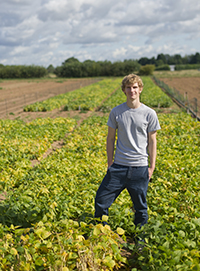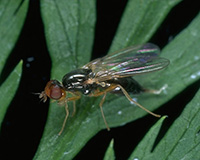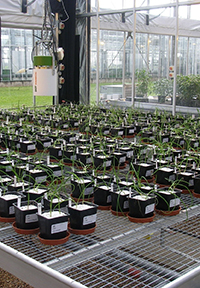Field and Glasshouse Research Trials
Field Trials - General Area
Wellesbourne campus is predominantly a sandy loam (sand over gravel) soil type.
- We operate 3 hectares annually within the main rotation fields for small-scale vegetable trials and other crops plus our specialist areas.
- We are an Officially Recognised site for GEP studies (ORETO 299 certificate).
Field Trials - Specialist areas
- Our low P&K status trials area is ideal for nutrient deficiency and uptake studies
- Our Quarantine Field is infected with soil borne diseases (allium whiterot, sclerotinia sclerotium, fusarium oxysporum, plasmodiophora brassicae, pythium violae) and is equipped with its own field laboratory.
- Our high populations of insect pests maintained on site (i.e. carrot fly, cabbage root fly and large narcissus bulb fly) invite insect studies relating to pest behaviours, novel treatments, varietal resistance, integrated pest management strategies etc.
Field Support Facilities
- Our on site bore hole provides irrigation water to an outdoor reservoir (18000 litre capacity) available for use in all experimental fields via an underground network of pipes and strategically positioned standpipes. It also supplies water to the glasshouses and polytunnels.
- Our Pesticide handling building is a contemporary design with ventilated secure storage area, equipment storage, office, laboratory and sentinel unit for waste effluent treatment.
- Our mechanic's workshop is equipped to undertake repairs, fabrication and servicing of all field trials equipment and vehicles.
Glasshouse Trials at Wellesbourne Campus
- Our high grade containment glass comprises a range of standard compartments all with full individual environmental monitoring for research purposes including a discrete Quarantine area fitted out with a suite of 4 small glasshouse compartments, 2 walk in growth rooms and a laboratory.
- Our thermogradient tunnels (allowing 4 C lift above ambient) can grow plants in soil or in pots on a covered floor and are ideally suited for studies relating to climate change
- In addition our range of basic protected crop facilities including tygan houses, polytunnels, pollination cages, Dutch light frames and sand beds may be used for small projects requiring isolation and/or outdoor temperatures.
Interested in using our field or glasshouse facilities?
Please email Sally.Mann@warwick.ac.uk

Field trial

Insect studies

Glasshouse trial
